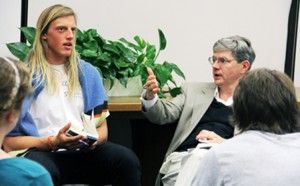Tonight Payson Library hosts round two of the Regents’ Scholars Student Board’s convocation event surrounding Malcolm Gladwell’s 2008 non-fiction book, “Outliers,” and the definition of success in a life of faith.
Students and faculty will reconvene to cover the spiritual application and pick up where the dialogue  ended last week. Participants, including Dean Rick Marrs, joined in the Kresge Room on Jan. 12 to respond to Gladwell’s piece entirely, headed by faculty and Regents’ Scholars Student Board members.
ended last week. Participants, including Dean Rick Marrs, joined in the Kresge Room on Jan. 12 to respond to Gladwell’s piece entirely, headed by faculty and Regents’ Scholars Student Board members.
This week, President Andrew K. Benton will lead attendees in addressing questions on individual relevancy and an outlier level of success, as well as applying a new faith-based definition to Gladwell’s commentary.
Titled “Outliers: Honoring God Through Success,” the two-part event relays the Regents’ Scholars Student Board’s larger effort to incorporate more of academia in convo credit-worthy discussions.
Last Thursday’s response to the book was positive, and the “Outliers” convo is perhaps the first to pioneer the blend of “an academic nature with the spiritual aspect,” board member junior Brandon Davies said.
“It’s kind of in the planning stages at the moment,” Davies said. “This is the first time we’ve done this.”
Dr. Michael Ditmore, director of American studies and Great Books interim director, spoke of personal and societal implications Gladwell posed:
“I think it’s important for Pepperdine students to consider not only how they look at success in terms of legacies and opportunities around them (a key Gladwell concept) but also in terms of how they as social leaders can be more discerning and effective in terms of shaping the success of others around them.”
Marrs opened the convo with a brief biography on Gladwell, a man Marrs described as the “singular talent for writing non-fiction in the literary arena” and praised for his “Americanness.” Segueing into the book’s unearthing chapters on the “10,000-Hour Rule” and the “Matthew Effect,” Marrs then challenged his audience to consider how these comment on God’s role in an individual’s success.
“Even though Gladwell didn’t specifically state that God has the bigger picture, it was very clear that all these patterns [in the book] weren’t evolving from mere chance,” board member junior Cassandra Edwards said.
Edwards explained the board’s decision to adopt a seemingly scientific, secular book for a Pepperdine convocation.
“You look at these people that Gladwell speaks about, and you see the culture they’re from, the opportunities they had, the schools they went to. And I didn’t see chance. I saw that God was putting these certain doors in front of them and, yes, they chose to follow,” Edwards said.
After the introduction, convo-goers formed small groups and began poring over their paperbacks.
Through a process of shared inquiry mirroring the Great Books model, the small groups conversed on the struggling balance between faith and success and how Gladwell fits into Pepperdine’s idea of vocation. Rather than defining success as personal wealth, Gladwell focuses on finding and completing meaningful work.
“Since Malcolm Gladwell’s book aims to affect our conventional notions of great success and failure — especially the Benjamin Franklin/Horatio Alger “rags-to-riches” myth so central to the American Dream — it really was stimulating and eye-opening to have such open responses from a cross-section of students,” Ditmore added.
“I don’t know what it is, but people are truly drawn to talk about Gladwell’s idea of success,” Davies said. “Maybe it’s the fact that he brings it forth in such an understandable, everyday way.”

